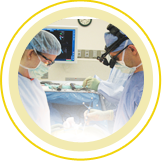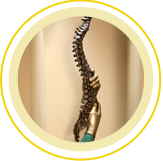Kyphosis
M.S.(Surgery), M.Ch.(Neurosurgery, S.G.P.G.I.), D.N.B.(Neurosurgery)
Kyphosis is a curving of the spine that causes a bowing or rounding of the back, which leads to a hunchback or slouching posture.
Kyphosis is curvature of the spine that causes the top of the back to appear more rounded than normal.
Kyphosis is a forward rounding of the back. Some rounding is normal, but the term "kyphosis" usually refers to an exaggerated rounding of the back. While kyphosis can occur at any age, it's most common in older women.
Causes :
Kyphosis can occur at any age, although it is rare at birth.
Poor posture (postural kyphosis) – slouching, leaning back in chairs and carrying heavy bags can stretch supporting muscles and ligaments, which can increase spinal curvatureabnormally shaped vertebrae (Scheuermann’s kyphosis) – if the vertebrae don't develop properly, they can end up being out of positionabnormal development of the spine in the womb (congenital kyphosis) – if something disrupts the spine's normal development, two or more vertebrae sometimes fuse togetherA type of kyphosis that occurs in young teens is known as Scheuermann disease. It is caused by the wedging together of several bones of the spine (vertebrae) in a row. The cause of this condition is unknown.
In adults, kyphosis can be caused by:
- Degenerative diseases of the spine (such as arthritis or disk degeneration)
- Fractures caused by osteoporosis (osteoporotic compression fractures)
Injury (trauma)Slipping of one vertebra forward on another (spondylolisthesis)Other causes of kyphosis include:
- Certain endocrine diseases
- Connective tissue disorders
- Infection (such as tuberculosis)
- Muscular dystrophy
- Neurofibromatosis
- Paget Disease
- Polio Scoliosis
- Spina bifida
- Tumors
Symptoms :
- Difficulty breathing (in severe cases)
- Fatigue
- Mild back pain
- Round back appearance
- Tenderness and stiffness in the spine



